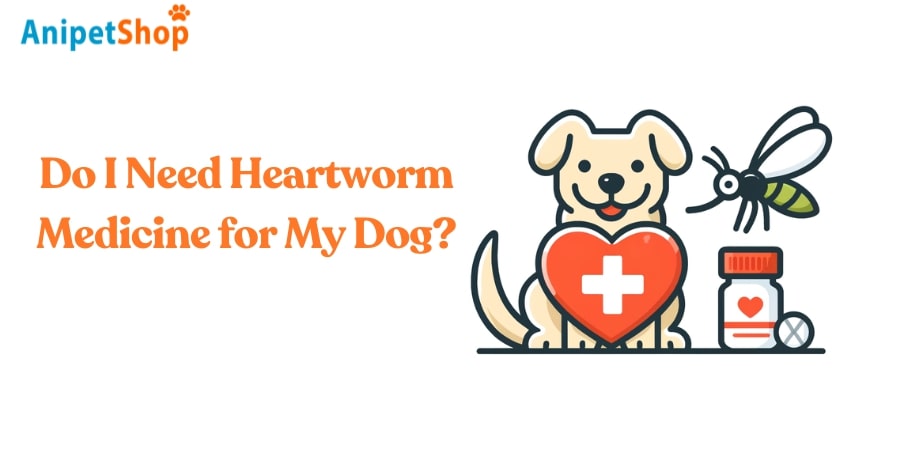Do I Need Heartworm Medicine for My Dog?
Heartworm disease is a serious and potentially life-threatening condition that affects dogs worldwide. It’s caused by parasitic worms that are transmitted through mosquito bites, making prevention a critical part of your pet’s health care routine. As a responsible pet owner, you may wonder if heartworm medicine is truly necessary for your dog. The answer is a resounding yes—regular preventive treatment is essential to protect your dog from this dangerous disease. By understanding the risks of heartworm infection and the benefits of prevention, you can ensure your furry friend stays happy, healthy, and safe from harm.

Do I Need Heartworm Medicine for My Dog?
Yes, heartworm medicine is essential for protecting your dog’s health and well-being. Heartworm disease is a potentially fatal condition caused by parasitic worms transmitted through mosquito bites. Without preventive medication, these worms can grow into adults, residing in your dog’s heart, lungs, and blood vessels, leading to severe damage and even death.
Preventative medication is highly effective in stopping heartworm larvae before they mature into harmful adult worms. Administering these treatments regularly is the simplest way to ensure your dog stays free from this dangerous parasite. Skipping prevention not only puts your dog at risk for serious health complications but also means you could face expensive and invasive treatments if your dog becomes infected.
Year-round heartworm prevention is crucial. Even if you live in a region with a seasonal mosquito population, gaps in protection can leave your pet vulnerable. Consistent medication, combined with annual heartworm testing, ensures that any infection is detected early, minimizing harm to your dog. This proactive approach offers peace of mind, knowing your furry friend is safeguarded against this life-threatening disease.
Investing in heartworm medicine is not just a preventative measure—it’s a vital step in protecting your dog’s long-term health. By maintaining regular prevention and testing, you can provide your dog with the best chance at a happy, healthy life free from the risks of heartworm disease.
BUY NOW: Heartworm Medicine for Dogs Without Vet Prescription

What happens if I don’t give my dog heartworm?
Choosing not to give your dog heartworm prevention puts their health and life at serious risk. Heartworm disease begins with a single bite from an infected mosquito, introducing microscopic larvae into your dog’s bloodstream. Without preventative medication, these larvae mature into adult worms that can grow up to a foot long, residing in your dog’s heart, lungs, and blood vessels. This can lead to life-threatening complications, including heart failure, lung disease, and severe damage to internal organs.
The progression of heartworm disease is slow but devastating. As the worms grow and reproduce, they obstruct blood flow, causing your dog to experience fatigue, coughing, and difficulty breathing. Over time, untreated heartworm disease becomes increasingly painful, with symptoms worsening as the infection spreads. Left unchecked, it leads to a prolonged and agonizing decline, often resulting in a preventable death.
Heartworm treatment for infected dogs is not only invasive and costly but also places significant stress on their body. Preventative medications are far safer, more affordable, and more effective than treating an active infection. Skipping prevention leaves your dog vulnerable to unnecessary suffering, while a simple, routine dose of heartworm medicine can protect them from this entirely avoidable threat.
By making heartworm prevention a priority, you safeguard your dog’s health and spare them from the dangers and discomfort of this deadly disease. Prevention is a small, manageable step that ensures a lifetime of health and happiness for your beloved pet.
Do Indoor Dogs Need Heartworm Prevention?
It’s a common misconception that indoor dogs don’t need heartworm prevention. While it’s true that outdoor dogs face higher exposure to mosquitoes, no dog is entirely safe from these pests—and the heartworm disease they can transmit. Mosquitoes are remarkably adept at entering homes through open doors, windows, or even small gaps, making indoor spaces far from immune to their presence.
Heartworm disease doesn’t discriminate based on how much time your dog spends outside. Even a brief exposure to a single infected mosquito indoors is enough to transmit the disease. This is particularly true in regions with warmer climates, like Georgia, where mosquitoes thrive year-round and can easily infiltrate homes. The risk persists even in cooler seasons, as mosquitoes may linger in indoor environments longer than expected.
While the chances of an indoor dog encountering mosquitoes might be lower than for an outdoor dog, the consequences of infection are just as severe. Heartworm disease can lead to life-threatening complications, including damage to the heart, lungs, and other organs. Prevention is far safer, easier, and more cost-effective than treating a full-blown infection.
Ultimately, the best way to protect your dog – whether they live indoors or spend most of their time outside – is through consistent, year-round heartworm prevention. By taking this simple step, you ensure that your dog remains healthy and safe from a disease that can strike anywhere, even within the walls of your home.

Expert Opinions and Recommendations
Veterinarians unanimously endorse using a combination of monthly preventives and annual testing to protect your dog from heartworm disease. These experts emphasize that a year-round preventive regimen is crucial, even in regions with colder climates. Heartworm preventives not only stop the development of heartworm larvae but also help control other parasites like roundworms and hookworms.
Veterinary professionals recommend annual testing to ensure the preventive measures are effective. A simple blood test can detect heartworm infection early, allowing for prompt treatment before severe complications arise. Skipping these tests can lead to undetected infections, which can become life-threatening.
Experts also advocate for discussing your dog’s specific needs with your veterinarian. Factors like your dog’s age, health status, and local heartworm prevalence should guide your preventive strategy. Veterinarians can help you choose the right preventive product, whether it’s an oral tablet, topical solution, or injectable option.
Moreover, they stress the importance of consistency. Missing doses or delaying tests can increase the risk of infection. By following expert recommendations, you’ll significantly reduce your dog’s risk of heartworm disease, ensuring a healthier, happier life for your furry friend.

You absolutely need heartworm medicine for your dog. Heartworm disease is serious and can affect any dog, regardless of age or breed. Monthly preventives and annual testing are crucial for keeping your furry friend safe. Always consult your vet for personalized advice and stick to a consistent preventive regimen.
By doing so, you’ll ensure your dog stays healthy and happy, free from the dangers of heartworm disease. Don’t take any chances—protect your dog today.
See More:
- Do Senior Dogs Need Heartworm Medication?
- What to Do if I Miss a Dose of My Dog’s Heartworm Preventative?
Lily Watson is an author specializing in veterinary care in Australia. With a profound passion for animal welfare and a solid foundation in veterinary science, Lily has dedicated herself to disseminating valuable knowledge and information for both pet owners and professionals in this field.

